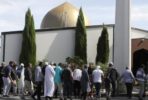A semi-official manifesto by an all-female brigade from the Islamic State lays out a guide for women, including their main role (being a wife), chief focus (stay at home, study religion) and tips on marriage (beginning at age 9).
The manifesto — possibly the first of its kind — was published on a jihadi forum in Arabic last month and is purported to be from the media wing of the al-Khanssaa Brigade, an all-female militia set up by the Islamic State, also known as ISIL or ISIS.
The Quilliam Foundation, a British-based anti-terrorism think-tank that published the text in English, said it is a recruitment tool for Muslim women to join the militant group, which controls parts of Iraq and Syria. Quilliam calls the document a “heavily propagandized snapshot of living conditions for women in its territory.”
The treatise describes an idyllic setting for women in the main Islamic State cities of Mosul in Iraq and Raqqa in Syria, offering a harsh comparison with life for women in Saudi Arabia. It says women in cities controlled by the Islamic State can move about in safety, are not forced to study or mingle with men and have access to education, primarily the study of Islam.
It strives to underscore that women should not be relegated to an uneducated status; nonetheless, it stresses that the fundamental function for women is “in the house with her husband and children” and notes a distinction between studying and earning a living.
“Pursuing these desired goals, above all else, is enlightened, cultured and developed,” the manifesto says. “We say, regarding each gender’s role, that to have a job is a task reserved only for men —- he has been given the body and brain, and he must tend to his women, wives, daughters and sisters, according to his circumstances.”
It emphasizes that a woman’s place is in the home, to look after husband and children, although there are some exceptions: to study the sciences of religion, to serve as a doctor or teacher or to to engage in jihad “if the enemy is attacking her country and the men are not enough to protect it.”
Otherwise, the manifesto stresses, it is “always preferable for a woman to remain hidden and veiled, to maintain society from behind this veil.”
The manifesto offers what it calls an unofficial but “quick, simple proposal” for how women should live.
From ages 7 to 9, they should study religion and Quranic Arabic, as well as subjects such as accounting and natural sciences. From 10 to 12, they would concentrate on more religious studies, focusing on the rules for marriage and divorce, as well as train in such skills as textiles, knitting and basic cooking.
From 13 to 15, they would focus on sharia, or religious law, more manual skills, particularly regarding raising children, and on Islamic history, the life of the prophet Mohammed and his followers.
“It is considered legitimate for a girl to be married at the age of 9,” it points out. “Most pure girls will be married by 16 or 17, while they are still young and active. Young men will not be more than 20 years old in those glorious generations.”
Far from presenting this life as constraining, the manifesto portrays it as an idyllic condition seen in Mosul and Raqqa. After Islamic State militants took control of those areas, veils and hijabs returned, “and decency swept the country.”
“Now, women are able to travel to their people in Raqqa without having to show their face to the eyes of even one inspector,” the manifesto says. “Respect for their bodies has returned and has been taken from the eyes of onlookers, with their corrupted hearts. Causes of their humiliation are prevented, revealing dresses were confiscated from shops, and scandalous photos were banned from walls and shelves. Muslims, with the permission of God, were cleansed.”
By comparison, the manifesto says, women are trapped in a “sorry situation” in Saudi Arabia, where women “work alongside men in shops like banks, where they are not separated by even a thin sheet of paper.”
In Saudi universities, the manifesto says, men and women “mingle in the hallways as if they were in an infidel country in Europe.”
Haras Rafiq, managing director of the Quilliam Foundation, says the manifesto answers what kind of life “jihadist brides” will find if they join the Islamic State.
The manifesto, he says, allows people “to get into the mind-set of the hundreds, perhaps thousands, of women who willingly join its (Islamic State’s) ranks.”
Source: www.usatoday.com







